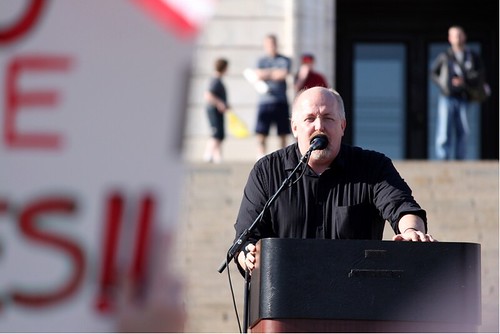While I think my parents thought I might grow up to be an academic, I turned off that track bright and early. One of the things that sparked that swerve was the notion that you could – and many would-be professors do – slave away for years and years, and are still not really considered professors until they get “tenure”. Until they got tenure, life was an endless parade of crummy jobs, moving constantly, being treated like (by academic standards) crap.
I preferred the much more stable world of radio.
The point, of course, was that life on the academic track was nasty, brutish, and tenuous – until one achieved that magical state of tenure.
Which was, if nothing else (in theory) a fairly objective state. Either one had it, or one did not, and one usually knew what was required to get it. It was pretty black or white.
Some of life’s issues break out like that – with a black or white answer. Others, not so much.
And with still others, it really depends on how you come to the issue.
———-
Abortion’s never been my biggest topic. The way I figure, if we lose the war on terror, the Planned Parenthood staff and the Pro-Life Minnesota staff are both pretty well screwed. If this nation isn’t secure, none of us will be protesting at abortion clinics; if the nation is prosperous (ergo Republican), people will be either financially secure enough to want the babies, or working too hard to have sex enough to make it an issue.
Make no mistake about it, I’m pro-life. I think abortion is wrong. A pro-“choice” dogmatist will try to read some big pathology about “wanting to control women” into that. It’s garbage, of course; with two teenagers, I realize that my odds of “controlling” anyone are slim to nil.
No, it’s because I value human life and because being pro-“choice” involves a leap of faith that I can’t justify.
That’s right. The “anti-religious” stance on abortion requires the leap.
Bear with me here.
Last week, I was reading Jeff Fecke,writing over at “Shakespeare’s Sister”, your one-stop shop for shrill, skin-deep “feminism”. Now, I’ll admit – I’ve given Fecke a hard time this last year or so; partly due to things like this, sometimes for things like this, and largely for his nonpareil skills as a single-A-league Atrios impersonator. Sometimes I read, sometimes I ignore.
But since he refers to me (later on), I figured it was worth a read.
My memory was tripped by this Monday quote from Mark Steyn. Ordinarily you’d expect he’d be saying something about how the Muslims have taken Oberammergau,
Given the influence of John Stewart on the left’s sense of humor, in a generation no liberal will be able to dismiss an opposing idea without some sort of labored exaggeration. I may hold a telethon.
But I digress:
but on Monday, he decided to take a break, and instead defend the stalking of a 12-year-old boy and his family:
Michelle Malkin reports that the blogospheric lefties are all steamed about the wingnuts’ Swiftboating of sick kids, etc.
Sorry, no sale. The Democrats chose to outsource their airtime to a Seventh Grader. If a political party is desperate enough to send a boy to do a man’s job, then the boy is fair game. [Emphasis mine]
“Fair game.” Now where had I heard that before?
I’m tempted to answer “the same place the writer learned – or didn’t learn – about context”.
But never mind; we’re about to find out!
Back in May, my friend and then-editor at Minnesota Monitor, Robin Marty, announced she was expecting a child. It was great news for Robin and her husband Steve, and obviously those of us who know them were happy for them.Now, Robin was and is a longtime supporter of abortion rights. Something about women having the right to determine what happens in their own bodies.
Well, let’s cut the euphemism; abortion rights is the ability for women to (depending on your point of view) destroy an inconvenient (or, rarely, dangerous) tissue mass, or destroy a human that can’t quite exist outside the womb yet.
Everyone can “control what happens to their own bodies”; it’s called “wearing a rubber”, “taking precautions”, “being aware that sex has consequences”, or – heaven/goddess/physiology forfend – keeping your clothes on.
The usual response is “sex shouldn’t be tied to having kids”. And it’s there that pro-life and pro-“choice” people split.
We’ll get back to that very shortly.
Anyhow, like many pro-choice women, Robin was still able to enjoy her pregnancy, knowing that even though it was early in her term, the fetus that she carried was going, eventually, to grow into her child.This is, of course, something those of us who are pro-choice get.
I remember that moment back when my daughter was in about her 25th week, when I was almost certain she was going to be a Crock Pot. The funny part was, I felt the same thing about my son!
I’m not quite sure what Fecke means by this; as a pro-life father of two, I most definitely knew my kids were – God or physiology or blind capricious fate willing – going to grow into the vexing, voracious teenagers they are today. Does he really think that there’s something about being OK with abortion that grants some special perspective on rearing children?
I’m willing to chalk it all up to sloppy writing – Fecke is nothing if not reliably imprecise. If, on the other hand, that is what he (or any other pro-“choice” person) believes – well, I’d love to hear more.
Let’s chalk it up to “sloppy writing” and ignore the digression and move on:
I knew that at one month, two months, even four months, my daughter really didn’t exist yet.
Let’s stop right here – since it does, in fact, illuminate the entire difference between the sides in this “debate”. The overarching question is “when does life begin”; the empirical answer is “we don’t know yet”. To the pro-life person, the response is “err on the side of life, since life is absolutely sacred”. To the pro-choice person, it is…
…whatever it takes to support the fundamentally political thesis that undergirds the pro-“choice” movement. In other words, a leap of faith.
Let’s start at the beginning.
A fertilized egg – without the aid of any medical intervention, either either caring for it or “terminating” it – will spontaneously abort itself, or “miscarry”, about 1/4 of the time.
And in places with no medical care whatsoever – including Minnesota, not much over 100 years ago, during our great-great-grandparents’ lifetimes – a child was 1/3 likely to die in childbirth, or within the first year thereafter.
Thus – without any aid (or assault) from medicine – a conceived egg left to its’ own devices has a 50-50 chance of becoming a living, breathing, independent human being, through a process that exists for no other reason than to create human beings, using physiology that – pleasurable and species-reinforcing side-effects aside – exists purely to create more human beings. Human beings that need some help getting started – a place to quickly evolve, we hope, from zygote to fetus to baby.
To the pro-“life” person, the implication is that one of sex’s consequences is that, if the right sperm meets the right egg, the couple – fella and dame – are entering into something that transcends either of their own lives, much less their own bodies; the creating of another human being, who will – physiology or God or remorseless chance willing – will one day be just like us, only maybe a little better. Because sex has such far-reaching, legitimately life-altering consequences, we alter our behavior accordingly – we abstain (even to the point of abjuring sex outside of marriage), or we are extra-cautious, believing as we do that a “fetus” is something that might not be “viable”, per se, but that is intended to be viable (knowing also that no “fetus” is “viable” until it can hold a job and pay its rent), and which is imbued with a moral significance by the very fact that it is intended to be human one day. Something we have no more right to extinguish for being inconvenient than a hospital has to euthanize intensive care patients (who, indeed, are often no more capable of living outside the ICU than a 18 week old fetus is of living outside the womb.
To a pro-“choice” person, the zygote is a mass of tissue until – at some hard-to-determine point that nonetheless seems to usually swerve to the side of convenience, including up to the moments before birth in all-too-many cases – it isn’t.
In summation: cohesive view about the role of reproduction in life and the ethical and place of the “fetus” in that process, versus belief in a mystical change in state from “tissue mass” to “human” that takes place…when? When the head comes out? When the “fetus” gets past the earliest point medical science has been able to sheperd a preemie to life? When government, in the infinite wisdom of a body of people who eschew studying either science of philosophy for the here-and-now noodling of the law, says it turns into a human?
Given that, wouldn’t it be much more fair to say that “given my attachment to the notion of this mystical unknown threshold, I believed she didn’t really exist yet”. Because you have no objective, empirical measurement – nothing analogous to, say, “it exists”. Such a belief is, objectively, no more grounded in fact than belief in a flat earth or Ron Paul.
And – since this post moves on to talk about thresholds for taking offense at satire – Fecke should be aware that the notion that a fetus “doesn’t exist” is no less objectionable than saying a profoundly handicapped child or a comatose person “doesn’t exist”.
Had my ex-wife suffered a miscarriage, we would have been sad, of course, but I know in my bones that we would not grieve the way we would…well, let me put it this way. I can type “if my ex-wife suffered a miscarriage.” I can’t even bring myself to type out the hypothetical that would apply to my daughter now. The mere thought makes me sick to my stomach. If anything happened to my daughter, a part of me would die, forever. I would never be the same, and I would never want to be. Had my ex suffered a miscarriage? It would have been sad, and we would have grieved for the idea of the child we’d expected.
Which is true, as far as it goes; every day of my then-wife’s pregnancy, I hoped and prayed for her health, and theirs – just as I hope God or blind cruel fate keeps the drunk drivers and diseases and random tragedies at bay for them. I hoped for this before they were born, and as they’ve grown and turned into people with personalities with whom I have three combined decades of history, it’s only grown.
But – this is rather important – that’s a matter of human nature, a sign that you are a fairly normal parent. One has developed attachments and history with a seven year old; with a “fetus”, there are only hopes.
It’s not an objective metric about the beginning of life.
This is a roundabout way of saying that one can believe a fetus is not yet a person, and still be excited about pregnancy.
Abortion is, obviously, one of the most contentious issues there is. Like many such issues, there is a hard core of 10% on the right that wants it banned and criminalized, and 10% on the far left that wants to make it a civil sacrament. In between, there are an awful lot of shades of belief, including many – myself included – who are fundamentally libertarian, but believe personally that life begins at conception and that a “fetus” – given the fate that God or physiology or remorseless fate has in mind for at least half of them if you leave them alone – is attended with a little more moral gravity than a toenail or a plantar’s wart, and that just because God or evolution or what-have-you has set things up so that that incipient life form needs a female uterus for a few months isn’t a sign of its lack of ethical and moral weight, but a sign of how much weight the whole idea of physiology, sex, pregnancy, reproduction and men and women themselves have in the great scheme of things.
Is it a belief? Yes. Not much different than “a fetus is a blob of tissue until we really want it not to be.
Which ties us, at long last, into the real subject of this post – something that was even more contentious than the abortion issue itself, at least among regional bloggers, few months back:
And Robin was. So like any good blogger, she posted an image of the first ultrasound.
At this point, enter Tom Swift, crazy Minnesota blogger and erstwhile GOP candidate for school board in St. Paul. (I won’t link to him, and if he finds his way back here, Melissa, terminate him with extreme prejudice.) [As good a symbol of gutlessness as I’ve seen, really – Ed] He blogs under the name Swiftee, and he created an image to welcome Robin and Steve’s child into the world:

You get it? Because Robin was pro-choice, she might decide to abort the child she wrote about, so let’s get it some protection.
Not to speak for Tom Swift – a person who truly needs nobody to speak for him – but that is the most overdramatic possible reading of his point.
What was his point? Maybe that any “fetus” – not Robin’s, in particular, or not just hers – might have reason to be nervous, since the same consciousness that decides he or she is important enough to carry to birth can change his or her mind. Or maybe – given the number of people who don’t credit a fetus with “existence” until the umbilical is cut – that given the existence of partial birth abortion the “fetus” is never really safe. Maybe that a mythical, cognitive “fetus”, lacking an objective, hard-wired standard like “Tenure” that’d cause his/her parents (in general, not Rew and Smartie) to consider him/her a real person, isn’t any safer than that non-tenured professor – except the fetus isn’t going to wind up teaching freshman literature at Normandale if he/she doesn’t make the convenience cut.
Caustic, tactless and very, very pointed? Sure. Not that that’s ever really stopped anyone from ripping on commentators before.
But we’ll come back to that.
That’s not the interesting part of the story, though. Swiftee’s image got those of us on the left seething, but we let it go, primarily because we don’t want to give him the traffic. But that seething got back to local blogger Mitch Berg, who styles himself as a “reasonable conservative,” someone who believes in hitting his opponents hard, but fairly. And Mitch’s response to Swiftee was what I remembered:
Is Robin and Smarty’s baby “fair game” for satirists, given that
1. she put the ultrasound out on her public website, and
2. she and her colleagues from the “Minnesota Monitor” rentablog she “edits” have stumped for abortion on demand and partial birth abortion, and fumed and phumphered when the SCOTUS shot the procedure down?
Well, I’d say “I hope not” – but of course, in the world of internet “cartoonists”[…]pretty much everything is fair game. If there’s an unflattering or embarassing pic of yourself out there somewhere online, it’s going to pop up sooner or later, intended to dink at some belief of yours or another.
So – did Swiftee “cross a line” with his cartoon? What line? Where? In the coarse thrum of the political blogging interchange, I’m not sure there’s a line left anymore; any line one person draws is someone else’s sport to cross, and ones’ best bet is to strictly separate the personal and the public (as, indeed, I do). The one that civil people try to observe when dealing with one another…
Very Pilate-like, Mitch was. But it was that line — “fair game” — that caught my memory. Mitch styles himself as reasonable, but if you cross out the official hemming and hawing, [I’m official? Who knew? Did anyone catch my title? – Ed] Mitch’s meaning is clear: heck yes, the child of Robin and Steve is fair game. If you can make a political point by attacking the Martys, then by all means, go for it.
Well, that’s one way of looking at it.
Here’s something else I wrote about the whole flap last spring – something that reveals a lot more about my side of this flap than the bit Fecke chose to quote:
A fetus baby with a helmet. It’s kinda funny, if you don’t know the people involved. Still funny when you do, but it makes me a little uneasy. I generally prefer to keep politics impersonal. And yet it’s hard to look at, say, this (not safe for work or queasy stomachs; it’s the end-result of a “partial birth abortion”, and it’s horrific) and not want to make it very personal and not-abstract-at-all for those who support it.
One thing that most of us who favor free speech accept as a given is that nobody has a right not to be offended. Many of us – myself included, and the orthodox Catholic Tom Swift even more so – are offended by the existence of abortion, especially the partial-birth variety, via which parents not a whole lot different than Rew or Smartie could decide that the baby, as Fecke noted at the beginning of this post, “didn’t exist yet”.
Did it bother me that Swift took a photo from someone I actually know, like and respect? Of course it did. I like the Martys. I wish ’em the best; I’d be pleased as punch to bring a basket of garf rags (cloth diapers), A’nD and Desenex to the baby shower. I also think that, as people who’ve assumed the role of public figures (when Rew took on the job of editing the local sorosblog “Minnesota Monitor”) they were nuts to put any part of themselves or family life out in public. I’ve been a “public figure” of one sort or another since I started in radio when I was 16; I’ve had anti-semitic death threats (I’m not Jewish), I’ve had stalkers (and still do, although they’re really not very smart ones) – and so I keep my kids, my job, my girlfriends (when I have one) and their kids religiously out of this blog and everything else I write. Partly because anything you do put out there is “fair game”; partly because the concept of “fair game” is unfair.
Tom Swift is also a friend, someone I know and respect – but to call him a “bull in a china shop” is to underestimate a bull’s tact, as least on the blog. He’s the kind of person every pro-“choice” activist wishes would just shut up and go away.
And while I wish that the world – and its agent, in this case, Tom Swift – had left Rew and Smartie’s ultrasound pictures alone, and that this flap wouldn’t have involved two sets of friends of mine (and that puppies didn’t die, for that matter), the fact is that Swiftee was right. It was perfectly-aimed satire – and for left-leaning public figures (as Fecke is) to barber that it’s “tasteless” opens us all up to an endless dissertation about “tasteless” satire that the left defends even more blythely on principle, and with even less consideration, with counterexamples and counter-counterexamples, ad infinitum.
It sucks that it involved people I know.
Of course, it wouldn’t be a Fecke post without the jump from out-of-context to unsupportable:
What is happening to the Frosts is not unusual, and not unique. It happened to Melissa and Amanda when they had the temerity to be women with opinions who wanted to work in politics
Who had made a blogging career out of saying some things that were every bit as objectionable as Fecke finds Swiftee, and which a bunch of unpaid conservative bloggers had the “temerity” to point out to people. That’s what we do. To paint Melissa Macewan and Amanda Marcotte as hapless victims is both a crime against context and, oddly, intensely anti-feminist.
It happened to John Murtha, who had the unmitigated gall to be an anti-war ex-Marine. It’s happened over and over, and will happen over and over again.
Just ask Gennifer Flowers!
Mitch was right: there is no line anymore, at least for the right. Everyone is “fair game.”… If they can attack a woman using her own ultrasound records for the sin of being both pro-choice and an excited expectant mother, they will do it.
Leave aside Fecke’s sloppy use of the omnipresent “they”, as if right wing bloggers are part of some monolithic medusa controlled by some central brain, and the irritating victim-mongering. Let’s shoot for honesty, here (on the off-chance that any of Fecke’s audience read this) – nobody “attacked” Robin.
And if the “fetus” “doesn’t exist” as a person yet – that was Fecke’s line, remember – then where’s the attack?
I’ll ignore all criticism, by the way – I think I’ll adopt Jeff’s “I know you’re not really a person” as a defense…
Continue reading →























